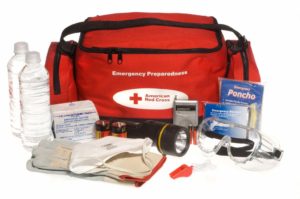Be Aware
Build a Kit
The first step in making preparations is to consider how an emergency might affect your individual and household needs. Plan to make it on your own for at least 72 hours. This means keeping food, water and other supplies stored in an easy-to-carry container located in a convenient location.
Emergency preparedness is not just a concern for homeowners; renters are equally at risk. Having an emergency supply kit is critical for everyone.
Check the supplies, change stored water, and rotate food supplies every six months. Check your kit when you change your clocks each spring and fall, just as you change the batteries in your smoke alarms. Consult your physician or pharmacist about storing prescription medications.
Basic Essentials:
- Water for drinking and sanitation – one gallon of water per person and pet per day for at least three days
- Food – at least a three-day supply of nonperishable food that does not require refrigeration or cooking and requires little to no water
- First-aid kit
- Battery-powered or hand-cranked radio and an NOAA Weather Radio with tone alert flashlight or headlamp
- Extra batteries for radios, flashlights and other electronics
- Cell phone, chargers and external power supply
- Whistle to signal for help
- Dust mask to help filter contaminated air
- Can opener (if kit contains canned food)
- Moist towelettes, garbage bags and plastic ties for personal sanitation
- Plastic sheeting and duct tape to shelter in place
- Wrench or pliers to turn off utilities
- Local maps
Additional Items to Consider:
- Prescription medications and glasses
- Cash and change
- Important family documents such as copies of insurance policies, identification and bank account records in a waterproof portable container
- Emergency reference material such as a first-aid book or smart phone apps (such as those developed by the American Red Cross)
- Sleeping bag or warm blanket for each person
- Complete change of clothing, including a long-sleeved shirt, long pants, sturdy shoes, and undergarments
- Infant formula and diapers
- Fire extinguisher
- Matches in a waterproof container
- Feminine supplies and personal hygiene items
- Mess kits, paper cups, plates, plastic utensils and paper towels
- Books, games, puzzles or other activities for children
- Paper and pencil
- Food, extra water and vaccination records for your pet


